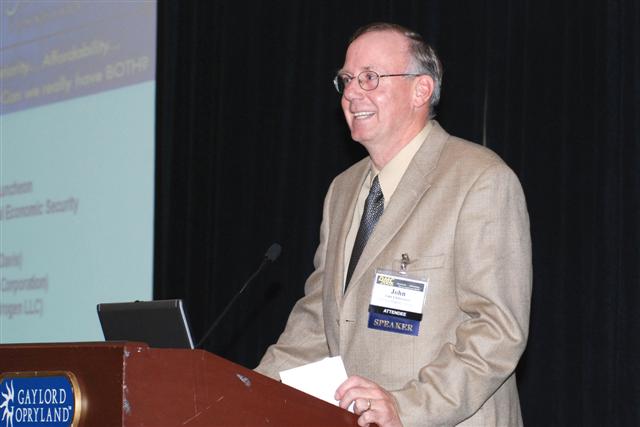 John Christensen |
As the forklift industry climbs the fuel cell learning curve, more trials and demonstrations are giving substance to the technology's potential.
In spreading the message, the Washington-based National Hydrogen Association (NHA) organised a 10 December webinar with presentations from a Raymond Corp manager and a National Renewable Energy Laboratory (NREL) subcontractor.
NHA aims to break down the commercialisation barriers to the use of hydrogen as an energy source.
Steve Medwin says the fuel cell industry has made significant technical and commercial progress, and "the real work experience is increasing."
Medwin, manager of advanced research with Greene, New York-based Raymond, serves as chair of a newly formed energy storage system (ESS) committee of the Industrial Truck Association (ITA). Over four years, Medwin has evaluated the use of fuel cells for powering material handling equipment.
Unlike batteries, fuel cells operate the same whether in a cold or hot environment, Medwin says. "Cold storage may be the 'killer app' for fuel cells. Batteries do not do well in cold storage."
Medwin says the US market for forklift fuel cell implementation is ahead of the markets in Europe and Japan.
He believes the value proposition for fuel cells in forklifts has improved, particularly with the increased tax credit available under the Emergency Economic Stabilisation Act of 2008. The tax credit is USD3,000 per kilowatt-hour or 30% of the unit price, whichever is less, and the length of the credit's annual availability was extended to 2016.
"The tax credit may bring some creative financing," notes Pete Devlin, the webinar moderator and lead for market transformation and manufacturing research and development with the US Department of Energy (DoE) hydrogen program.
Medwin notes the forklift industry is working on compatibility of fuel cell units with forklifts, in part through the ITA, also based in Washington.
Design is part of the challenge. Typically, a forklift truck is designed around the batteries with the center of gravity "based on a big lead acid battery," Medwin observes. With fuel cells, "this new way to store energy takes an effort to define what we need from the fuel cell unit".
The ITA's ESS committee has drafted a recommended practice to facilitate communication between manufacturers of forklifts and ESS equipment.
Medwin says five critical requirements for fuel cells have been identified including size, weight, center of gravity, power delivered and power absorbed.
As for the practical characteristics, "hydrogen supply and infrastructure are the key to a successful installation", according to Medwin.
Medwin gives an upbeat illustration. Foodservice industry provider Sysco Corp has operated Class 3 pallet trucks with fuel cell power at two Michigan distribution centres under a US Department of Defence-funded demonstration project. The goal is to show savings in total ownership and operational costs of hydrogen fuel cell power packs versus the existing battery packs.
Medwin says Sysco managers after six months were happy with the performance of the fuel cell units and are experiencing lower peak usage of electricity, wanting to get rid of battery and charging units at the two locations.
Forklifts from Raymond operated in the Grand Rapids, Michigan centre, and forklifts from Crown Equipment Corp of New Bremen, Ohio were used in Sysco's Canton, Michigan distribution location.
Medwin provides more details about Raymond's two-year in-plant research program, which received funding from the New York Energy Research & Development Authority
(Forkliftaction.com News #343).
The indoor refueling system became operational in May 2007 and dispensed 363 kilograms of hydrogen in 561 refueling procedures from August 2007 to October 2008.
"We have five units running with acceptable performance," Medwin reports. "Operators do the refueling, and the drivers like the consistent performance."
One downside: fuel cells in active use emit sounds louder than those coming from batteries.
A Cellex-brand system from Plug Power Inc of Latham, New York operates on a Class 3 Raymond 8400 AC and has logged 269 stack hours.
The other systems are installed on Class 2 Raymond 7400 AC/AC forklifts with these operational results during the reporting period: a Plug Power GH1 unit for 1,272 stack hours, a Plug Power GH2 unit for 1,175 hours, a unit from Hydrogenics Corp of Mississauga, Ontario, Canada for 160 hours and a unit from a team of East Penn Manufacturing Company Inc of Lyon Station, Pennsylvania and Nuvera Fuel Cells Inc of Billerica, Massachusetts for 150 hours.
Medwin illustrated some of the complexity today. From the Deka website for Raymond forklifts, he showed one of 20 pages of different battery sizes and types. East Penn Manufacturing makes the Deka battery line and, on its website, has guides listing batteries for 21 brands of forklifts.
In April, Raymond signed a joint development agreement with Ballard Power Systems of Vancouver, British Columbia, Canada to develop a forklift prototype powered by the next generation of Ballard's Mark9 SSL fuel cell product. "Ballard is a key to the success of this project" with a goal of achieving a low cost of ownership, Medwin notes.
NREL subcontractor John Christensen says four forklift two-year demonstration projects are in the pipeline for a range of renewable energies including hydrogen-powered fuel cells. Christensen retired in 2007 after 28 years with the defence logistics agency (DLA) of the US Department of Defence. Golden, Colorado-based NREL supports the US DoE hydrogen program.
In the first project, the defence depot in Susquehanna, Pennsylvania plans to add 20 new fuel cell-powered forklifts and retrofit 20 existing forklifts with fuel cells. Christensen says a 10 February event will kick off the Susquehanna project, which has a value of about USD5.3 million and includes establishment of an indoor dispensing system for delivering liquid hydrogen.
The Susquehanna project will compare the lines of two fuel cell producers. Plug Power will outfit the new forklifts, and the Deka Nuvera team will work on the retrofit forklifts.
The defence depot at Warner Robins, Georgia expects to get 20 forklifts with fuel cells, have hydrogen reformed on site from natural gas and test mobile refueling capabilities. Construction is slated to begin in January. The project has a value of about USD4.8 million.
While not occurring at a depot, a comparable project at the US Army's Fort Lewis in Pierce County, Washington calls for 19 new forklifts, generation of hydrogen, heat and power from waste digester gas and a mobile refueler for dispersed activities. Construction is slated to begin in 2009 with operations starting in 2010.
 Steve Medwin |
The San Joaquin Valley defence depot in Tracy, California intends to replace 20 propane-powered forklifts and generate hydrogen onsite using solar energy for electrolysis. An office of the defense energy support center is negotiating the power purchase agreement for solar-based hydrogen production. Construction should begin in mid-2009.
"Data collection is critical" in evaluating the effectiveness of the program, Christensen notes.
In targeting populations for fuel cell power trials, Christensen reports the US Postal Service operates about 10,000 vehicles and DLA has more than 4,000. By the year 2012, "we want to ramp up from (purchase of) 200 units per year to about 2,000" including backup standby fuel cell systems, Christensen says. By that time, "the cost of units would come down and be of interest to the commercial side."
DoE's Devlin adds: "We will try to shoot for 400 lift trucks and 1,600 back-up units. On the forklift side, we are putting together a national action plan with an interagency task force. But we need appropriated dollars."
An installation for the postal service in the San Francisco, California area is expected "to give them a hands-on view at a regional distribution centre" utilisation of the technology, Christensen says. The postal service operates about 300 distribution centers.
The industry pursues technology for an effective proton-exchange-membrane (PEM) fuel cell. Through the demonstration projects, "we are helping to buy down the R&D while gaining public acceptance of PEM technology", according to Christensen.
Further detailed discussions about forklifts and fuel cells are scheduled at the Materials Handling Industry Association's ProMat 2009 event on 12-15 January in Chicago, Illinois and NHA's conference and hydrogen expo from 30 March-3 April in Columbia, South Carolina